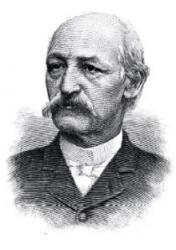Planning worship?
Check out our sister site, ZeteoSearch.org,
for 20+ additional resources related to your search.
- |
User Links
Person Results
I. B. Woodbury
1819 - 1858 Person Name: Isaac Baker Woodbury Composer of "TALMAR" in The Chapel Hymnal Woodbury, Isaac Baker. (Beverly, Massachusetts, October 23, 1819--October 26, 1858, Columbia, South Carolina). Music editor. As a boy, he studied music in nearby Boston, then spent his nineteenth year in further study in London and Paris.
He taught for six years in Boston, traveling throughout New England with the Bay State Glee Club. He later lived at Bellow Falls, Vermont, where he organized the New Hampshire and Vermont Musical Association. In 1849 he settled in New York City where he directed the music at the Rutgers Street Church until ill-health caused him to resign in 1851. He became editor of the New York Musical Review and made another trip to Europe in 1852 to collect material for the magazine. in the fall of 1858 his health broke down from overwork and he went south hoping to regain his strength, but died three days after reaching Columbia, South Carolina.
He published a number of tune-books, of which the Dulcimer, of New York Collection of Sacred Music, went through a number of editions. His Elements of Musical Composition, 1844, was later issued as the Self-instructor in Musical Composition. He also assisted in the compilation of the Methodist Hymn Book of 1857.
--Leonard Ellinwood, DNAH Archives
I. B. Woodbury
Claude Goudimel

1514 - 1572 Person Name: Claude Goudimel, 1514-1572 Composer of "CHIGWELL" in The Cyber Hymnal The music of Claude Goudimel (b. Besançon, France, c. 1505; d. Lyons, France, 1572) was first published in Paris, and by 1551 he was composing harmonizations for some Genevan psalm tunes-initially for use by both Roman Catholics and Protestants. He became a Calvinist in 1557 while living in the Huguenot community in Metz. When the complete Genevan Psalter with its unison melodies was published in 1562, Goudimel began to compose various polyphonic settings of all the Genevan tunes. He actually composed three complete harmonizations of the Genevan Psalter, usually with the tune in the tenor part: simple hymn-style settings (1564), slightly more complicated harmonizations (1565), and quite elaborate, motet-like settings (1565-1566). The various Goudimel settings became popular throughout Calvinist Europe, both for domestic singing and later for use as organ harmonizations in church. Goudimel was one of the victims of the St. Bartholomew's Day massacre of Huguenots, which occurred throughout France.
Bert Polman
Claude Goudimel
Henry K. Oliver
1800 - 1885 Person Name: Henry Kemble Oliver, (1800-1885) Composer of "SAXONY" in The Sunday School Hymnal Henry Kemble Oliver (b. Beverly, MA, 1800; d. Salem, MA, 1885) was educated at Harvard and Dartmouth. He taught in the public schools of Salem (1818-1842) and was superintendent of the Atlantic Cotton Mills in Lawrence, Massachusetts (1848-1858). His civic service included being mayor of Lawrence (18591861) and Salem (1877-1880), state treasurer (1861-1865), and organizer of the Massachusetts Bureau of Statistics and Labor (1867-1873). Oliver was organist at several churches, including Park Street Congregational Church in Boston, North Church in Salem, and the Unitarian Church in Lawrence. A founder of the Mozart Association and several choral societies in Salem, he published his hymn tunes in Hymn and Psalm Tunes (1860) and Original Hymn Tunes (1875).
Bert Polman
Henry K. Oliver
E. E. Higbee

1830 - 1889 Author of "Jesus, o'er the grave victorious" in The Chapel Hymnal Born: March 27, 1830, St. George (near Burlington), Vermont.
Died: December 13, 1889.
Buried: Emmitsburg, Maryland.
Son of state legislator Lewis Higbee and Sarah Baker Higbee, Elnathan was educated at the University of Vermont, graduating in 1849. By the time of his graduation, he had already begun teaching school in Burlington at age 16; his first permanent position was as an assistant teacher at an academy in Woodstock, Vermont. He stayed there only a short time before moving to another teaching position in Emmitsburg, Maryland, becoming head of the mathematical and classical departments at a school organized by his brother-in-law, George W. Aughinbaugh. In 1850, he accepted a position s a private tutor in the family of Joshua Motter of Emmitsburg, among whose daughters he found his future wife.
Around late 1851 or early 1852, Higbee entered the Theological Seminary of the Reformed Church at Mercersburg, Pennsylvania, where Philip Schaff was among his teachers.
He went on to become a preacher, poet, and educator, and for nine years, served as Superintendent of Public Instruction of Pennsylvania. After seminary, he taught mathematics at the high school in Lancaster, Pennsylvania, for a year. Later in his life, when he was state superintendent for education, he would discover one of his old pupils had become principal of the Lancaster high school.
In 1845, Higbee was licensed to preach the Gospel by the Maryland Classis of the Reformed Church. His first pastorate was at the Congregational Church in Bethel, Vermont. In 1858, he returned to Emmitsburg, and 1859 to the First Reformed Church of Tiffin, Ohio, where he also filled the chair of Latin and Greek at Heidelberg College. In 1862, he moved to Pittsburgh to become pastor of Grace Church. In 1864, he became professor of Church History and New Testament Exegesis at the Theological Seminary of the Reformed Church in Mercersburg, Pennsylvania. While there, he was of the prime movers in the foundation of Mercersburg College in 1865. In 1881, Governor Hoyt appointed him State Superintendent of Public Instruction of Pennsylvania.
Sources: Pennsylvania School Journal
www.hymntime.com/tch/
E. E. Higbee


 My Starred Hymns
My Starred Hymns


